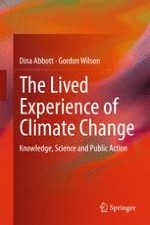2015 | OriginalPaper | Chapter
8. Lived Experience, Science and a Social Imagination
Authors : Dina Abbott, Gordon Wilson
Published in: The Lived Experience of Climate Change
Publisher: Springer International Publishing
Activate our intelligent search to find suitable subject content or patents.
Select sections of text to find matching patents with Artificial Intelligence. powered by
Select sections of text to find additional relevant content using AI-assisted search. powered by
